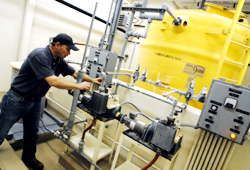USA - Water fluoridation: A debate with teeth
 Kevin Pottle, director of water
Kevin Pottle, director of watertreatment for Bangor Water
Dis-trict, checks the controls
near a 3,000-gallon fiberglass
tank filled with hydrofluosilicic
acid.
Just this week in Bangor, a local pediatrician advised the city council that one of the largest water utilities in Maine should discontinue its fluoridation program, which started here in 1967. Dr. Leonardo Leonidas told the council Monday evening that fluoride is more accessible in the average American diet than ever before,
putting people at risk for ingesting too much. While he promotes dispensing fluoride as a supplement to children who don’t get enough, Leonidas feels it is more appropriate to prescribe it on a case by case basis, rather than dosing entire populations through the public water supply.
Leonidas’ proposal — drawn on studies from India and China, a recent report from a respected American research institute and his own observations — disappoints and angers area dentists and public health advocates, who fear his request will stir up unfounded controversy over a widely accepted practice with proven benefits. But concern about fluoride is nothing new, and despite its apparently benign presence in the tap water we drink and cook with, there are plenty of people who think we’d be better off without it.
Long article
0 Comments:
Post a Comment
<< Home